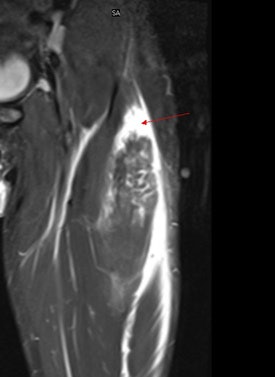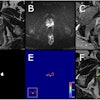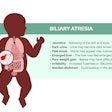
A mobile CT unit with teleradiology capability that began operation in May 2013 at London's Wembley Stadium aims to deliver a prompt emergency diagnosis for injured football players.
Spire Healthcare, a major provider of imaging to the U.K. private and public sector, has provided the CT system to join with the company's network of imaging and performance centers (Spire Perform) that are connected to a PACSMail teleradiology network from Sybermedica.
 In spite of the growing use of mobile CT at sports stadiums, MRI has become the frontline modality for investigating football injuries. This MR image shows a muscle tear in a professional footballer diagnosed via PACSMail. Image courtesy of Drs. Jerry Healy and Justin Lee, Chelsea and Westminster Hospital, London.
In spite of the growing use of mobile CT at sports stadiums, MRI has become the frontline modality for investigating football injuries. This MR image shows a muscle tear in a professional footballer diagnosed via PACSMail. Image courtesy of Drs. Jerry Healy and Justin Lee, Chelsea and Westminster Hospital, London."The scanner link to PACSMail enables injured players to be scanned at the stadium and then sent for online review by the on-call radiologist, who can assess the extent of the injury," said Sybermedica's CEO, Stephen Gatley. "This ability to give the team doctor rapid access to remote specialist opinion is especially valuable in the event of a suspected head injury."
The idea of the PACSMail network was born in 2006 when Dr. Bryan English, at the time medical director of Chelsea Football Club, voiced the need for such a service in the Premier League. He wanted to be able to send scans online to his radiologists, especially in the case of players who were injured when competing away from home, Gatley explained.
Inspired by the speed and ease of communication enabled by social networking technology, Sybermedica created the medical communications service, PACSMail, for secure online sharing of diagnostic images and reports. Clinicians can sign in to the network on any Internet-connected computer to send and receive medical information, including diagnostic images, no matter where the club is training or competing.
Remote clinical specialists such as musculoskeletal (MSK) and neuroradiologists can then quickly review the images and, if needed, send an embedded annotated image -- saved and indexed alongside the original scan, together with their online report. For the player, the club, and the club doctor, the key advantage is rapid access to specialist sports medical opinion. In addition, the system allows clubs to create a comprehensive club archive of all their diagnostic images that can be sent online from the imaging centers or imported from CDs.
"PACSMail has eliminated the delays and costs of sending patient CDs by courier. It also permits the building of a secure archive of CDs of past injuries, enabling all club records to be kept in one safe and secure space," Gatley noted.
 Spain and the Middle East are key areas for future growth, according to Sybermedica CEO Stephen Gatley.
Spain and the Middle East are key areas for future growth, according to Sybermedica CEO Stephen Gatley.
Since 2006, the network has evolved as a nexus of communication in sports medicine that now includes rugby, athletics, and other elite sports organizations wanting immediate access to the opinions of surgeons, radiologists, and physiotherapists. Although in the U.K. there are several National Health Service (NHS) users, the network is currently predominantly used by private sector subscribers.
It was also used during the London 2012 Olympics. Although imaging was available at or near all U.K. Olympic venues, radiological interpretation was focused on the Olympic Village, with the network used in remote reporting for regional events, Gatley explained.
"If an injury took place in Wales or Scotland, for example, images could be sent to London for radiological interpretation," he added.
Other uses of the network include supporting the UEFA Champions League's research program into the relationship between hamstring injury severity and return to play times for footballers. A European network is also currently under development to provide image and report communications to support the Team Sky medical team.
While PACSMail was born in sports medicine, it is constantly evolving to include other areas where there is a need to provide urgent access to remote expertise or to overcome local resource shortages, according to Gatley. In large cities such as London, for example, traffic congestion often makes it difficult for experts to travel to smaller imaging centers and the network is widely used to ensure rapid reporting of neuroradiology and mammography images.
Internationally, Sybermedica is currently looking at developing a network centered in Madrid and providing imaging services elsewhere in Spain.
"Spain is in a very difficult economic situation, which may benefit from a rethink on how radiology services are delivered. Hopefully we can determine how regional scanners can be supported by providing them with remote access to subspecialty radiological expertise," Gatley said.
Sybermedica is also starting to develop a network in the Middle East, initially focusing on MSK service provision. This will allow local doctors to access online expertise, for example from a U.K.-based surgeon in the case of a complex injury, and it will also allow patients traveling abroad to send scans back to their doctor when needed.



















